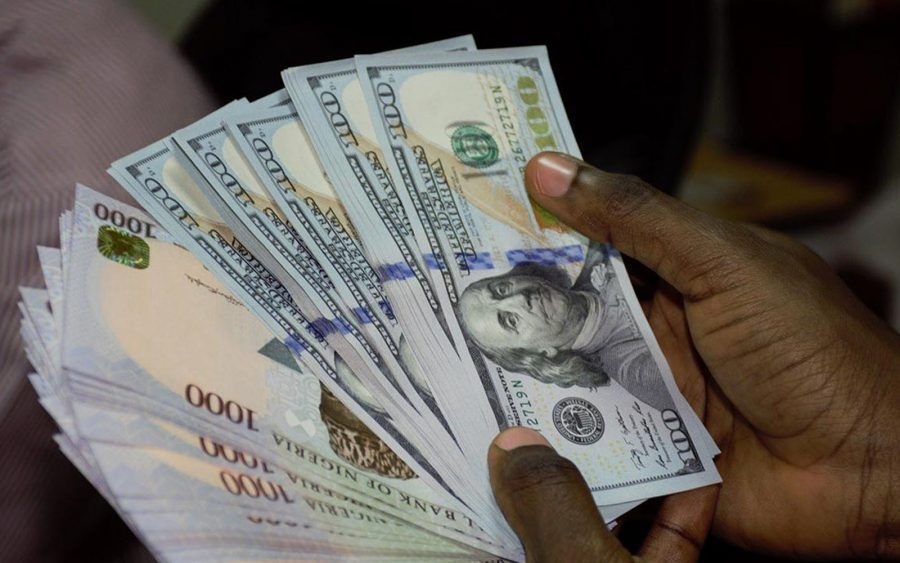Monday, 22nd November 2021: The exchange rate between the naira and the US dollar closed at N415.07/$1, at the Investors and Exporters (I&E) window, where forex is traded officially.
Naira started the week with a 0.16% fall to close at N415.07/$1 on Monday compared to N414.4/$1 recorded on Friday, 19th November 2021. On the other hand, forex turnover at the official window surged by 114.7% to $149.53 million.
Meanwhile, the naira remained flat at the parallel market, as it closed at N546/$1, the same as recorded in the previous trading session. This is according to information obtained from BDC operators interviewed by Nairametrics.
Nigeria’s foreign reserve dropped yet again by 0.05% on Friday, 19th November to close at $41.39 billion compared to $41.41 billion recorded as of the previous day.
Trading at the official NAFEX window
The exchange rate at the Investors and Exporters window fell by 0.16% to close at N415.07/$1 on Monday, 22nd November 2021 from N414.4/$1 recorded at the close of the previous week.
The opening indicative rate closed at N413.53/$1 on Friday, which represents a 5 kobo appreciation compared to N413.55/$1 recorded in the previous trading session.
An exchange rate of N453.1 to a dollar was the highest rate recorded during intra-day trading before it settled at N415.07/$1, while it sold for as low as N404/$1 during intra-day trading. The highest daily has now recorded two consecutive days of increase.
Forex turnover at the official window increased significantly by 114.7% to $149.53 million on Monday.
According to data tracked by Nairametrics from FMDQ, forex turnover at the I&E window increased from $69.63 million recorded on Friday 19th November 2021 to $149.53 million on Monday 22nd November 2021.
Cryptocurrency watch
The crypto market started the trading session on Tuesday on the positive as the market capitalisation gained 0.8% to $2.51 trillion in the early hours of the day. Bitcoin also gained 0.61% to trade at $56,636.2 while Ethereum with a gain of 1.63% was trading at 4,161 as of the time of writing this article.
Nigeria has fallen down the list of countries with the highest interest in Bitcoin, surpassed by El Salvador. This is according to a recent article published by Nairametrics. Nigeria fell to the second position with a score of 61, while the Central American country takes charge with a perfect score of 100.
Meanwhile, the President of El Salvador, President Nayib Bukele, on Saturday revealed that the nation plans to build an entire city based on the trillion-dollar cryptocurrency asset, naming it, ‘Bitcoin City.’
According to President Nayib Bukele, the new city will be located along the Gulf of Fonseca, near a volcano. He also mentioned that the government plans on locating a power plant by the volcano to provide energy for both the city and Bitcoin mining.
Crude oil price
Crude oil prices started today’s trading session on a bearish note, with Brent Crude losing 0.97% as of 7am on Tuesday to trade at $78.93 per barrel, having been dominated by bearish sentiments in recent weeks, which saw the price of some of the major crude products drop below the $80 mark.
Similarly, West Texas Intermediate dropped 1.2% to trade at $75.82 per barrel, while Natural gas is currently trading at $4.761, representing a decline of 0.58% compared to the previous day.
Meanwhile, OPEC Basket gained about 1.2% to trade at $80.32 per barrel, while Bonny Light gained 1.49% to trade at $79.15. On the flip side, Nigerian crude, Brass River and Qua Iboe both lost significantly by 5.38% to trade at $78.44 per barrel.
According to a note by Goldman Sachs, the recent bearish trade in the global crude oil market is not justified by fundamentals, but due to overblown worries about a strategic petroleum reserve (SPR) release and a hit to demand from the COVID resurgence in Europe and the United States.
External reserve
Nigeria’s foreign reserve dropped further by 0.05% to close at $41.39 billion as of Friday, 19th November 2021 compared to $41.41 billion recorded as of the previous day. The decline is attributed to the continuous intervention of the apex bank in ensuring the stability of the exchange rate, a move that has seen the rate at the parallel market drop from N575/$1 to about N546/$1.
Meanwhile, the nation’s foreign reserve had gained $5.04 billion in the month of October, as a result of the $4 billion raised by the federal government from the issuance of Eurobond in the international debt market.
The gains recorded in the previous month is higher than the $2.76 billion gain recorded in the month of September 2021. Meanwhile, Nigeria’s reserve has now recorded a decline of $433.57 million so far in the month of November, while on a year-to-date basis, the reserves have gained $6.01 billion.
